 June 16, 2016 John E. Ross, KD8IDJ, Editor
| |||||||||
ARRL Now Offering New "Radio and Wireless Technology" Patch Program for Girl Scouts The ARRL has begun offering a new Girl Scouts "Radio and Wireless Technology" patch program that offers opportunities for participants to learn about wireless technology, including Amateur Radio. Scout leaders and Amateur Radio volunteers associated with the Greater Atlanta Girl Scout Council and Girl Scouts of the Green and White Mountains developed the program to incorporate information and exploratory activities that provide a backdrop for understanding radio communication. The program will encourage Girl Scouts to take on activities to gain knowledge and skills, as well as kindle an interest in science, technology, engineering, and math (STEM) subjects and careers.
The program defines the requirements for Girl Scouts to earn the patch at the Brownie, Junior, Cadette, Senior, and Ambassador levels. Girl Scouts can learn the fundamentals of radio communication and wireless technology, from broadcasting to smartphones, and apply what they learn to connect people, enhance safety, and explore related careers. In addition to acquiring the fundamentals, participants can explore radio science through hands-on learning with Amateur Radio, and use radio to talk around the world and for public service. They also can learn about the role of wireless technology in everyday life and in careers. Read more. FCC Turns Away Petition to Permit Experimental Operation on Amateur Bands The FCC has denied the 2015 petition of a Missouri radio amateur seeking to have the Commission authorize low-power experimental activity on Amateur Radio frequencies. James Edwin Whedbee, N0ECN, of Gladstone, sought to amend FCC Part 97 Amateur Service rules to let radio amateurs conduct experiments on all Amateur Radio bands, subject to certain limits on duration, power, and bandwidth. The FCC declined to put his petition on public notice and invite comments.
The letter pointed out that the FCC "recently revised and streamlined" its Part 5 rules "to provide additional flexibility to innovators" and noted that Whedbee did not discuss in his petition whether those rule changes might address his concerns. In the same stroke of the pen, the FCC denied a 2016 petition from Whedbee seeking to delegate to the chiefs of the Wireless Telecommunications Bureau (WTB) and the Office of Engineering and Technology (OET) the authority to dispose of certain requests for exemptions, waivers, and rulemaking regarding new technologies or new application of existing technologies. "The Commission has already delegated to WTB and OET authority to act on applications, waiver requests, petitions, and even some rulemaking matters, so long as they do not raise novel questions of law or policy which cannot be resolved under outstanding Commission precedents and guidelines," the FCC told Whedbee. "[W]e conclude that [both] petitions present no evidence of an existing problem or other evidence meriting a rule change, and we dismiss the petitions," the FCC concluded. Whedbee is no stranger to the FCC petition process. Earlier this year he petitioned the FCC to designate Morse (radiotelegraphy) Amateur Radio band segments as "symbol communication" subbands, and the FCC invited public comment on that request (RM-11769). In 2012, the FCC turned down Whedbee's request that the FCC declare homeowners associations' covenants, conditions, and restrictions (CC&Rs) unenforceable. Polish DXer 3Z9DX Reported Ready to Return to North Korea on a Moment's Notice In the wake of a surprise "demonstration" operation from North Korea -- officially the Democratic People's Republic of Korea (DPRK) -- in December, Polish DXer Dom Grzyb, 3Z9DX, is eagerly awaiting the call that will allow him to return to the most-wanted DXCC entity for another brief activation. Just when that will come could be anytime, however. DX-World and The Daily DX report that Grzyb has received confirmation that North Korea will authorize a 5-day operation, and he is ready to roll as soon as he gets word, which will be on short notice -- just enough time for him to book his flight, grab his gear, and head off. DX World reported that no notice would be given prior to the P5/3Z9DX activation itself.
There are other conditions: He may only operate on SSB and on one band, 20, 15, or 10 meters. No decisions will be made until Grzyb gets to the DPRK, however. Over the course of his unanticipated December 20-21, 2015, activation -- the first in more than a decade -- P5/3Z9DX made nearly 785 SSB contacts, most of them on 15 meters. Nearly 600 of the contacts were with stations in Asia; P5/3Z9DX worked just 26 stations in North America. He has posted his log on ClubLog. The ARRL DXCC Department subsequently approved the P5/3Z9DX operation for DXCC. -- Thanks to The Daily DX and DX-World Three Radio Amateurs on the ISS Head Home on June 18 Three radio amateurs on board the International Space Station (ISS) will depart the orbiting outpost at the end of the week. Expedition 47 Commander Tim Kopra, KE5UDN; Flight Engineer Tim Peake, KG5BVI/GB1SS, and Yuri Malenchenko, RK3DUP, will undock from the space station early on Saturday morning, June 18 (the evening of Friday, June 17, in US time zones) in a Soyuz TMA-19M spacecraft commanded by Malenchenko, after having spent 186 days in space since their December launch. NASA Television will provide coverage starting on June 17.
When the Soyuz undocks, ISS Expedition 48 will begin under the command of Jeff Williams, KD5TVQ. Williams and crewmates Oleg Skripochka, RN3FU, and Alexey Ovchinin will operate the station for 3 weeks until the arrival of the next crew increment. NASA astronaut Kate Rubins, KG5FYJ; Russian cosmonaut Anatoly Ivanishin, and Takuya Onishi, KF5LKS, of the Japan Aerospace Exploration Agency are scheduled to launch on July 6 from Baikonur, Kazakhstan. During their stay, Kopra and Peake scored some milestones for the Amateur Radio on the International Space Station (ARISS) program. On March 10, Kopra conducted the 1000th ARISS school group contact with students in North Dakota. The first contact occurred in December of 2000. Peake made use of Amateur Radio in his "Principia Mission" outreach, which aimed to directly engage students with communication technologies, inspiring them to pursue careers in science, technology, engineering, and math (STEM) fields. During his stay in space, Peake hosted 10 ARISS school group contacts, including the first to take advantage of the HamTV digital Amateur Radio television (DATV) system when he spoke with students in England on February 11. The DATV system in the Columbus module of the ISS allowed students at Royal Masonic School, home of GB1RSM, to see as well as to listen, as Peake, operating as GB1SS, answered their questions about life in space. Read more. National Parks on the Air Update One of the rarest locations in the National Parks on the Air (NPOTA) program will be activated on Saturday, June 18. The HacDX Amateur Radio Club, W3HAC, has secured permission to operate from the White House Visitor Center (DZ10), during ARRL Kids Day. Announced frequencies are 14,270, 7270, 14,042, and 7042 kHz from 1800 to 2300 UTC.
There are 55 NPOTA activations on the calendar for June 16-22, including Mesa Verde National Park in Colorado, and the James Garfield National Historic Site in Ohio. Details about these and other upcoming activations can be found on the NPOTA Activations calendar. Keep up with the latest NPOTA news on Facebook. Follow NPOTA on Twitter (@ARRL_NPOTA). The Doctor Will See You Now! "Grounding" is the topic of the latest (June 16) episode of the "ARRL The Doctor is In" podcast. Listen...and learn! Sponsored by DX Engineering, "ARRL The Doctor is In" is an informative discussion of all things technical. Listen on your computer, tablet, or smartphone -- whenever and wherever you like!
Enjoy "ARRL The Doctor is In" on Apple iTunes, or by using your iPhone or iPad podcast app (just search for "ARRL The Doctor is In"). You can also listen online at Blubrry, or at Stitcher (free registration required, or browse the site as a guest) and through the free Stitcher app for iOS, Kindle, or Android devices. If you've never listened to a podcast before, download our beginner's guide. Just ahead: "Are Linear Amplifiers Really Worthwhile?" Gear Up for ARRL Field Day with Official Merchandise ARRL Field Day -- the most popular operating event of all -- is June 25-26. There's still time to show your support for ARRL Field Day with official merchandise. Shirts hats, pins, patches, and coffee Order your 2016 ARRL Field Day merchandise from the ARRL online store or call (888) 277-5289 in the US, Monday through Friday, from 8 AM to 5 PM Eastern Time. Outside the US, call (860) 594-0355). While supplies last. Kids Day is Saturday, June 18 Kids Day is Saturday, June 18, from 1800 to 2400 UTC. The twice-yearly (January and June) event, sponsored by the ARRL and The Boring (Oregon) Amateur Radio Club, is an excellent opportunity to showcase Amateur Radio to youngsters and even to hand over the keys, so they can get some hands-on hamming experience. Share the excitement with your own children or grandkids, or with youngsters in the neighborhood! For youngsters, their positive ham radio experience may foster an interest that may lead them to become radio amateurs. For veterans, it's a chance to share their stations and affection for Amateur Radio with the next generation.
To solicit contacts, call "CQ Kids Day." The suggested exchange is name, age, location, and favorite color. There is no limit on operating time, and stations may work each other more than once if the operator has changed. Repeater contacts (with permission of the repeater's sponsor) are okay too, and satellite contacts may provide a real thrill. Observe third-party traffic restrictions when making DX contacts. All participants are encouraged to post stories and photos to the Kids Day Soapbox page and are eligible for a colorful certificate. You can download the free certificate, customized with the youngsters' names, after filling out the Kids Day Survey found on the same page as the certificate generator. Alternatively, you can send a 9 × 12 SASE to Kids Day Certificate Request, ARRL, 225 Main St, Newington, CT 06111. "The Magic Band" Lives Up to its Name in ARRL June VHF Contest Six meters sounded more like an HF band during the ARRL June VHF Contest over the June 11-12 weekend, as sustained sporadic E (also known as E-skip or Es) openings greeted participants. Some found 6 meter contacts so bountiful that they tended to neglect the other VHF/UHF bands, where conditions were more typical. "As for why the contest weekend was so good, all I can say is that June can be good for E-skip," said Carl Luetzelschwab, K9LA, the former "Propagation" editor for National Contest Journal (NCJ). "I think the term 'sporadic' in its name is well suited. We just don't understand the detailed processes of 6 meter Es."
For many, it was a 6-meters-only event, with the best conditions in several years and much of the action on CW. "This was the consummate 50 MHz festival, with wide-open bands throughout most of the contest," Bill Schwantes, W7QQ, in New Mexico, posted in his soapbox comments on the 3830 website. "For the first time in my memory I felt like a rate junkie, often reaching 200 per hour. What fun on 6, while ignoring long-haul, weak signal contacts on 144, 222, and 432." Bob Striegl, K2DRH, who boasts some serious VHF-UHF antennas in upstate Illinois, said the band "was going crazy" in the evening from the East Coast to Europe, and to Japan from the Midwest and South. "In a lull I tuned up JA7QVI, who was the strongest, and worked him on CW with low power!" Mike Smith, VE9AA, in New Brunswick called it, "A VHF (6 meter) contest I can write home about." He was one station's first 6 meter contact, and "was tickled to do that." Top-tier HF contester Dan Street, K1TO, in Florida, made his first 6 meter contact with Japan during ARRL VHF, only the third time he's operated in the event. "Conditions were amazingly different for all of us," Street said in his soapbox post. "I watched in awe as the W1s seemed to have a contest-long opening to somewhere. EA8DBM's skimmer made an incredible number of US spots, and he worked stations out to the West Coast. Yet here in Florida, I never heard him once, nor even one European." Eric Gruff, NC6K, in California also didn't get in on the excitement. "Another frustrating VHF contest from DM13," he posted. "[T]he majority of the time, I spent listening to the same local stations calling CQ incessantly, while the rest of the country was enjoying a huge opening." Charlie Panek, KX7L, in Washington, summed things up this way: "Every few years the planets line up right, and we get a good Es opening during the contest," he said. "This was one of those years!" Read more. White House Honors Limor Fried, AC2SN, Among "Champions of Change for Making" The White House will honor Adafruit founder Limor "Ladyada" Fried, AC2SN, on June 17 as one of 10 "Champions of Change for Making." According to the announcement, while an engineering student at MIT, Fried became determined to create a company that focused on supporting the learning of electronics for makers of all ages and skill levels.
"These individuals were selected by the White House for their personal passion and tireless efforts to make advances in technology and platforms, educational opportunities, or spaces that empower even more Americans to become tinkerers, inventors, and entrepreneurs," the announcement said. Fried founded Adafruit in 2005, and it has grown to now employ more than 100 individuals in a 50,000 square foot factory in New York City. As the company's sole owner, she has committed to building both innovation and community, and is known for creating resources for learning. "When Limor Fried looks at a circuit board, she sees it as a series of aesthetic choices -- a vehicle for self-expression, rather than simply the product of rational optimization," Nicola Twilley wrote in the March 3 edition of The New Yorker magazine. Twilley quoted Fried as saying, "I want to show people that engineering isn't something cold and calculated. Thinking like an engineer is a beautiful and fascinating way to see the world, too." Fried was the first female engineer on the cover of WIRED magazine, and she was named Entrepreneur of the Year in 2012 by Entrepreneur magazine. She also served on the NYC Industrial Business Advisory Council. Adafruit has expanded its offerings to include tools, equipment, and electronics, which Fried personally selects, tests, and approves before they go into the Adafruit store. The White House will live stream the recognition ceremony on Friday, June 17, at 1700 UTC. Read more. Well-Known DXer, DXpeditioner Milt Jensen, N5IA, Dies in Fall from Tower Well-known DXer and DXpeditioner Milt Jensen, N5IA, of Virden, New Mexico, died on June 10 after falling from an Amateur Radio tower. An ARRL Life Member, he was 73. According to the Pima County Sheriff's Department, Jensen was working on a tower on Arizona's Mount Lemmon when he fell. He was pronounced dead at the scene. The mishap is still under investigation.
"Milt was on one of his many tower climbing adventures, and, by no choice of his, it became his last," his oldest son, Jason, wrote in a QRZ.com post. Licensed in 1960, Jensen had lived in Virden for his entire life. Especially well known for his 160 meter activity, he spent several years constructing an "8-circle array" of full-sized 160 meter verticals -- each 125-foot towers -- at his station site south of Safford, Arizona, near the New Mexico border, Lee Finkel, KY7M, wrote in an article set to appear in the July/August issue of NCJ. Jensen operated his "dream station" remotely from his home, often using the call sign N7GP in contests. In addition to his Top Band operation, Jensen was heavily involved in designing, installing, and maintaining VHF and UHF mountaintop repeaters, remotely controlled base stations, and linking systems. As a contester, he often landed in the Top 10 standings. Jensen participated in three DXpeditions. He and his wife Rulene, KB5VTM, were part of the 1998 XZ1N team in Myanmar. In 2000, he returned to Myanmar as part of the XZ0A multinational team. In 2008, he was part of the Ducie Island VP6DX DXpedition team. Read more. Nepal Radio Amateur Describes Earthquake Response Effort at West Coast Gathering Amateur Radio's "vital role" in the 2015 Nepal earthquake response was the topic on June 2 as the City of Santa Clara, California, hosted Sanjeeb Panday, 9N1SP, of Tribhuvan University in Kathmandu Nepal. Given that the Silicon Valley and the Kathmandu Valley share the common geography of multiple, nearby earthquake fault lines, the subject was relevant. The Santa Clara Fire Department sponsored the presentation, with an eye toward applying the lessons learned in the wake of the Nepal earthquake to better prepare for a similar disaster in the Silicon Valley.
"The Nepali people have gone through a tremendous ordeal," Panday told the audience. "If our experience can help others in different parts of the world [to] better prepare for disasters, then this can be regarded as a positive outcome." Nearly 100 spectators attended Panday's presentation, including firefighters, emergency response officials, City of Santa Clara ARES/RACES members, Bay-Net participants, and members of the Nepali-American Community. Scout leader Richard Silkebakken, KM6CPH, and members of Cub Scout Pack 32 (Monterey Bay Council) presented Panday with two handheld transceivers for delivery to Scouts in Nepal. Also during the event, the office of US Rep Mike Honda presented the Global Nepali Professional Network (GNPN or CAN-USA) with a "Certificate of Special Congressional Recognition." Through its Radio Mala program, GNPN funded and helped to construct the only two Amateur Radio repeaters available in Nepal during the earthquake. Panday was in the US to attend the International Microwave Symposium (IMS), where he addressed a panel on Amateur Radio in post-secondary education. On June 1, he also spoke to the US Geological Survey. Second-generation Nepali-American Suresh Ojha, W6KTM, said he was gratified that the academic community and US jurisdictions are looking at Nepal's earthquake experience with an eye to applying the lessons learned to the challenges faced in the US. Read more. Europe's "Dayton" -- Ham Radio 2016 (Friedrichshafen) -- Takes Place June 24-26 ARRL will be well represented this month at Europe's premier Amateur Radio gathering -- Ham Radio 2016. The 3-day event, in Friedrichshafen, Germany, on the shores of Lake Constance, gets under way on June 24. ARRL President Rick Roderick, K5UR, will head the League's contingent to Friedrichshafen, which also will include International Affairs Vice President Jay Bellows, K0QB; CEO Tom Gallagher, NY2RF; Marketing Manager Bob Inderbitzen, NQ1R; Assistant Field Services and Radiosport Manager Norm Fusaro, W3IZ, and retired CEO David Sumner, K1ZZ. The annual show attracts upward of 15,000 visitors from around the globe. The co-sponsoring Deutscher Amateur Radio Club (DARC) has set a theme of "Amateur Radio -- On land, on water, and in the air" for this summer's event. Some 200 exhibitors from 34 countries will be on hand for this 41st "Friedrichshafen."
"There are as many different ways to operate Amateur Radio as there are places from which you can send radio transmissions: On land, on water, and in the air," DARC spokesperson Stephanie Heine, DO7PR, said. This year's program includes a "foxhunt" in woods near the fairgrounds, a youth camp, and the Ham Rally, where the next generation of radio amateurs can explore the world of technology and wireless. It's open to young people between the ages of 8 and 18. A Contest University (CTU) sponsored by the DARC will take place for radiosport beginners on Friday, June 24, and experienced contesters on Saturday, June 25, with sessions aimed at how to improve contesting performance. IARU Region 1 will host a meeting of those interested in emergency communication on Friday, June 24. The session will include an open forum for national coordinators to report on activities in their respective countries. Also up for discussion will be GlobalSet and changes to the IARU emergency message procedure. International Amateur Radio Union (IARU) President Tim Ellam, VE6SH/G4HUA, will head the IARU team to Friedrichshafen, along with IARU Vice President Ole Garpestad, LA2RR, and IARU Secretary Rod Stafford, W6ROD, a past ARRL president. Next year's big show in Friedrichshafen will take place July 14-16, owing to a scheduling conflict. Read more. The K7RA Solar Update Tad Cook, K7RA, Seattle, reports: It was a little scary to see the daily sunspot number at zero for 4 days -- June 3-6 -- but conditions seem to have recovered nicely. The average daily sunspot number for our June 9-15 reporting week was 29.1, up from 7.7 the previous week.
Average daily solar flux this week was 88.3, up from 80.7. Predicted solar flux for the next month is pretty flat, at 85 on June 16-30; 80 on July 1-5; 85 on July 6-9; 92 on July 10-11; 95 on July 12-18; 92 and 90 on July 19-20, and 85 on July 21-27. Predicted planetary A index is 18, 12, and 8 on June 16-18; 5 on June 19-21; 8, 10, 12, and 8 on June 22-25; 1 on June 26-27; 5 on June 28-July 1; then 25, 20, and 8 on July 2-4; 5 on July 5-6; 8 and 10 on July 7-8; 8 on July 9-10; 5, 8, 12, and 8 on July 11-14; 5 on July 15-19; 10, 12, and 8 on July 20-22; 1 on July 23-24, and 5 on July 25-28. Sunspot numbers for June 9 through 15 were 22, 28, 40, 39, 27, 26, and 22, with a mean of 29.1. The 10.7 centimeter flux was 85.2, 84.9, 88.2, 94.1, 91, 87.6, and 87.3, with a mean of 88.3. Estimated planetary A indices were 4, 9, 11, 10, 9, 21, and 14, with a mean of 11.1. Estimated mid-latitude A indices were 5, 9, 11, 9, 10, 15, and 15 with a mean of 10.6. In Friday's bulletin look for reader reports on recent 6 meter propagation. Send me your reports and observations at k7ra@arrl.net.
. . . . . .
This Week in Radiosport
See the ARRL Contest Calendar for more information. For in-depth reporting on Amateur Radio contesting, subscribe to The ARRL Contest Update via your ARRL member profile e-mail preferences. Upcoming ARRL Section, State, and Division Conventions
Find conventions and hamfests in your area.
. .
Subscribe to...
Free of charge to ARRL members...
| |||||||||
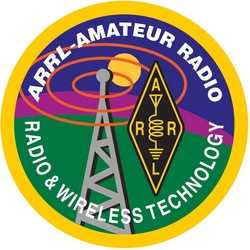 "The initiative for the program came about through my conversations with hams who wanted to work with Girl Scouts as well as Boy Scouts and wanted a patch program that would introduce ham radio, as the 'Radio' merit badge does in the Boy Scouts," said ARRL Education Services Manager Debra Johnson, K1DMJ. "I was introduced to a group of leaders with the Girl Scouts of Greater Atlanta who wanted to work in developing a new, fun patch program for radio that would fit with the
"The initiative for the program came about through my conversations with hams who wanted to work with Girl Scouts as well as Boy Scouts and wanted a patch program that would introduce ham radio, as the 'Radio' merit badge does in the Boy Scouts," said ARRL Education Services Manager Debra Johnson, K1DMJ. "I was introduced to a group of leaders with the Girl Scouts of Greater Atlanta who wanted to work in developing a new, fun patch program for radio that would fit with the .jpg) "[T]he Commission's rules contain numerous provisions for experimentation and development of new radio equipment and techniques," the FCC said in a June 9 letter to Whedbee. "The Experimental Radio Service (ERS) rules contained in Part 5 permit a broad range of experiments, including in the Amateur Service, and prescribe the manner in which the radio spectrum may be made available to experiment with new radio technologies, equipment designs, characteristics of radio wave propagation, or service concepts related to the use of the radio spectrum."
"[T]he Commission's rules contain numerous provisions for experimentation and development of new radio equipment and techniques," the FCC said in a June 9 letter to Whedbee. "The Experimental Radio Service (ERS) rules contained in Part 5 permit a broad range of experiments, including in the Amateur Service, and prescribe the manner in which the radio spectrum may be made available to experiment with new radio technologies, equipment designs, characteristics of radio wave propagation, or service concepts related to the use of the radio spectrum."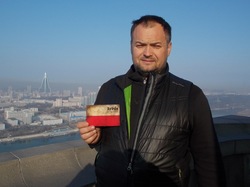
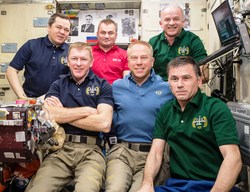
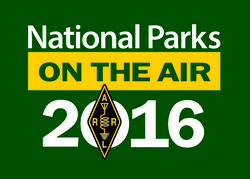 The group, which has secured the call sign W3H for this activity, plans other NPOTA Activations on August 25 -- the actual date of the National Park Service's 100th anniversary -- and in October for Scouting's Jamboree On the Air (
The group, which has secured the call sign W3H for this activity, plans other NPOTA Activations on August 25 -- the actual date of the National Park Service's 100th anniversary -- and in October for Scouting's Jamboree On the Air (.jpg) Every 2 weeks, your host, QST Editor in Chief Steve Ford, WB8IMY, and the Doctor himself, Joel Hallas, W1ZR, will discuss a broad range of technical topics. You can also e-mail your questions to
Every 2 weeks, your host, QST Editor in Chief Steve Ford, WB8IMY, and the Doctor himself, Joel Hallas, W1ZR, will discuss a broad range of technical topics. You can also e-mail your questions to 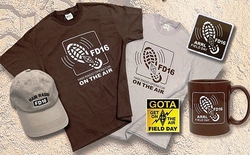 mugs
mugs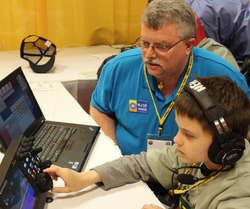
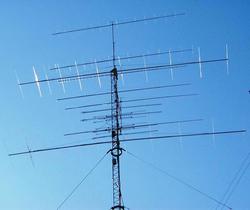

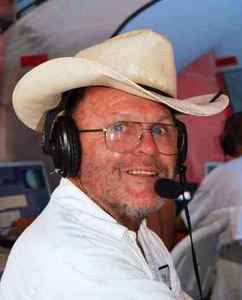
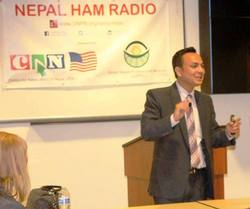
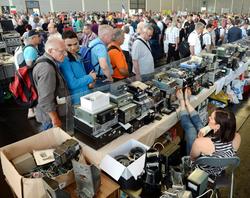
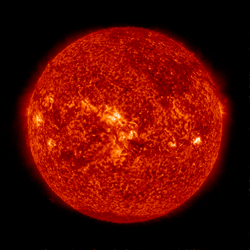 Due to the way sunspots are counted, the minimum non-zero sunspot number is 11. A sunspot number of 11 means there is one sunspot (counting as one point) in one sunspot group (adding 10 points). A second sunspot raises the sunspot number to 12, unless that spot is on its own and not clustered with the other spot, in which case the sunspot number would be 22. So, that average daily sunspot number of 7.7 from the previous week is due to the fact that 4 out of the 7 days had sunspot numbers of zero; you would never see a day with an actual sunspot number of 7.7.
Due to the way sunspots are counted, the minimum non-zero sunspot number is 11. A sunspot number of 11 means there is one sunspot (counting as one point) in one sunspot group (adding 10 points). A second sunspot raises the sunspot number to 12, unless that spot is on its own and not clustered with the other spot, in which case the sunspot number would be 22. So, that average daily sunspot number of 7.7 from the previous week is due to the fact that 4 out of the 7 days had sunspot numbers of zero; you would never see a day with an actual sunspot number of 7.7.








